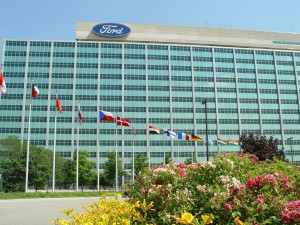Ford is the only automaker in the U.S. expected to gain marketshare in the next few years because their prolific rate of new vehicle introductions. The rest of the companies are unlikely to gain or lose large pieces of marketshare, according to a new study by Bank of America Merrill Lynch.
John Murphy, the Merrill Lynch analyst who has assembled the annual “Car Wars” study or the past 15 years, told the Automotive Press Association, that the big shifts in marketshare in the U.S. have now passed based on an analysis of product introduction.
General Motors was the major marketshare donor during the past three decades, but GM has now right-sized and its share should remain relatively stable, according to the “Car Wars” analysis.
“It’s been trending that was for the past three or four years,” said Murphy, who noted that GM, as well domestic rivals, Ford and FiatChrysler, have become much more adept at keeping their product lines fresh by introducing new vehicles.
“The entire industry has caught on to the fact you have to keep your entire product line fresh” he said noting replacement cycles have converged across the industry, making it much more competitive and reducing expectations of a major swing.
In fact, Ford could well be one of the big marketshare gainers during the next four years, increasing its overall share of the U.S. market by one half a point – a large in the current environment – to 16.2%, according to the Merrill Lynch analysis.
Honda is also likely to gain share, but FCA, Hyundai, Kia, GM and Toyota are all expected to register no losses or gains during the period covered by the study, which encompasses the period from 2014 through 2018.
European carmakers and Nissan, which has an “unfocused” product strategy, could wind up losing share. The marketshare of smaller Japanese companies, Mitsubishi, Mazda and Subaru, also is at risk because they do not compete in all the key segments, Murphy said.
(Study sees rise in fatal crashes related to marijuana use. For more, Click Here.)
Murphy, however, also said the market gains predicted for FiatChrysler during the next four years are clearly unrealistic, he said. For one thing, FiatChrysler will be treading water during 2015 and 2016 as it introduces fewer new vehicles.
Ford will be taking a risk when it introduces its new aluminum-body F-150 later this year, Murphy said. But the introduction of the new F-150 also offers the potential for significant gains by offering customers better fuel economy and in a shorter amount of time. Many of Ford’s fleet customers are already use aluminum-bodied trucks in some capacity and switching to aluminum eases Ford’s transition to tougher fuel economy standards.
(Click Here for details about rising sales and fuel economy in May.)
The F-150 also could be the prototype for how the industry will meet future fuel-economy standards, Murphy said. Americans aren’t going to flock into smaller cars, but they are probably willing to pay a little more for a lighter-weight vehicle with better fuel economy that allows them to drive a vehicle with a large or at least familiar interior space, he said.
Carmakers could even wind up getting additional pricing for the vehicles, making the entire industry more profitable.
(To see more about Ford and GM gaining sales in China, Click Here.)
The small-car segment, however, still has life in it at this point. The B-segment crossover vehicles coming from manufacturers, such as Honda and GM could re-invigorate the entire segment, he said.
Murphy added while new product remains critical he does not foresee the appearance of an entirely new vehicle segment in the next few years. Technology, especially engine and safety technology, will continue to improve but no truly disruptive technology has emerged in the industry at this point and appears unlikely to show up in the next four years or the period covered by the study.


How accurate were his predictions in the past 15 years?